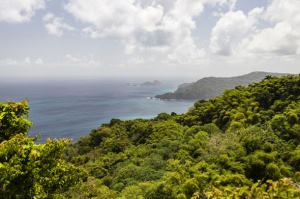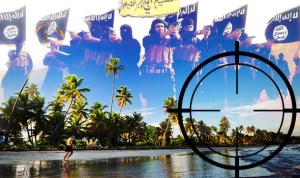
From Remote, Luxurious Islands to Terrorist Breeding Ground: Trinidad and Tobago

© Getty – Trinidad and Tobago
When people hear the words Trinidad and Tobago they think of lush, remote islands, all-inclusive resorts, and some of the most beautiful beaches the Caribbean offers. They might think of the country that beat the United States’ men’s soccer team in its 2018 World Cup qualifier. It’s unlikely that many would think of the islands as a potential Caribbean terrorist breeding ground. Few associate the Caribbean with terrorism at all – it is, axiomatically, a place we visit to leave our worries behind.
But between 2013 and 2014, “At least 130 people (have) traveled to Syria to live and fight under the flag of ISIS,” according to the government of Trinidad and Tobago. “More than 200 people (have) traveled from the Caribbean in recent years to join ISIS” [1]. These numbers are increasing at an alarming rate as ISIS continues to bombard Trinidad, and the greater Caribbean, with propaganda. To put these numbers into perspective, Canada, and the United States, together, “…have produced fewer than 300 recruits who made the journey east” [2]. The numbers seem comparable until you consider that Canada and the United States are, collectively, 263 times as populous as Trinidad.

© Getty Images – ISIS propaganda targets the people of Trinidad and Tobago
Security in the Caribbean pales to that in the United States and Europe and that makes Caribbean officials’ nightmare worse. If Trinidadians radicalize in Syria or Afghanistan and return to the islands they could ideologically poison a vast reserve of Caribbean youth. “Trinidad’s citizens can travel through the Caribbean without visas” [2]. Radicals could hop from island to island converting new recruits to their cause.
A reader could be forgiven for thinking this is Trinidad’s first brush with terrorism. But, there was a failed coup in 1990 mobilized by the Trinidadian Islamist group Jamaat al Muslimeen. For six days, Jamaat al Muslimeen held hostages including the Prime Minister and government officials at Trinidad’s seat of Parliament (the Red House), and at the headquarters of Trinidad and Tobago Television. There was also a foiled terrorist plot to attack New York’s J.F.K. airport in 2007 hatched by Islamists in Trinidad’s neighbor, Guyana [1].
Given Trinidad’s proximity to the United States, radicalized individuals potentially plotting attacks on U.S. soil poses a significant security risk. There is the fear that, “Trinidadian fighters will return from the Middle East and attack American diplomatic and oil installations in Trinidad, or even take a three-and-a-half-hour flight to Miami” [3]. President Trump recently spoke, “…with Prime Minister Keith Rowley of Trinidad and Tobago about terrorism and other security challenges, including foreign fighters” [3]. That conversation is already occurring at the highest levels between the U.S. and this modest Caribbean island speaks volumes about the gravity of the situation.
President Trump’s conversation with Trinidadian Prime Minister Rowley comes just after, “…U.S. troops participated in anti-terror raids Thursday in the Caribbean nation of Trinidad and Tobago helping to capture four ‘ high-value targets’ [4]. US Southern Command (SOUTHCOM) forces, “…advised and assisted local Trinidadian security forces,” in the capture of these individuals, “…who are believed to be part of a network engaged in plotting terror attacks” [4]. The Caribbean celebration of Carnival was set to begin Monday, February 12th. With the, “…vibrantly coloured costumes of the participants and incredible celebrations” [5] the prospect that this Carnival could be the site of the next terrorist attack is not far off.

© CNN/Mara Soff – Carnival J’ouvert in Trinidad and Tobago, Feb. 16, 2015
Trinidad and Tobago is, “…top of the list of Western countries with the highest rates of foreign-fighter radicalization,” and, “…by far the largest recruitment hub in the Western Hemisphere” [6]. Trinidad and Tobago must address, at root, issues of radicalization and recruitment on the island before they begin to take a toll on tourism. If not handled properly, we may see ISIS inching ever closer in coming years to the U.S. mainland. As for right now, Trinidad and Tobago must continue to capitalize on its access to foreign forces like the U.S. and Canada to continue deterring the ever-growing problem of radicalization in its midst.
Sources:
- https://www.express.co.uk/news/world/870509/ISIS-latest-news-holiday-warning-threat-Caribbean-Trinidad-Tobago-jihadi
- https://www.theguardian.com/world/2018/feb/02/trinidad-jihadis-isis-tobago-tariq-abdul-haqq
- https://www.nytimes.com/2017/02/21/world/americas/trying-to-stanch-trinidads-flow-of-young-recruits-to-isis.html
- https://www.cnn.com/2018/02/09/politics/trinidad-carnival-terror-attack-thwarted/index.html
- https://www.ticketgateway.com/c/trinidad-and-tobago-carnival
- https://www.theatlantic.com/international/archive/2016/12/isis-trinidad/509930/
